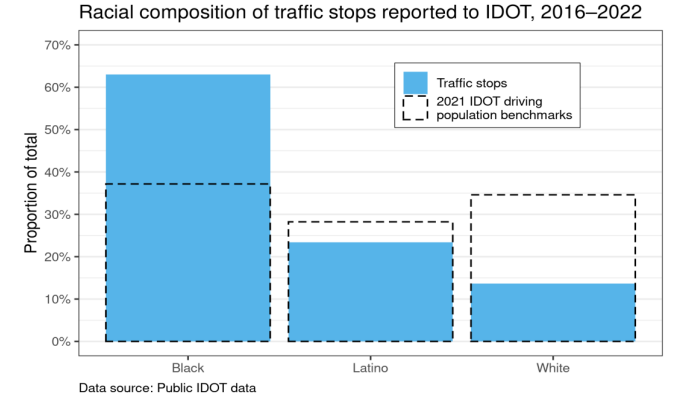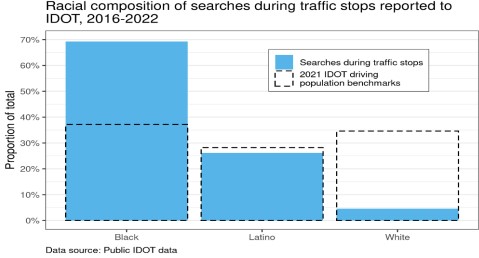Class Action Claims Chicago Police Dept. Targets Drivers of Color with Unconstitutional Traffic Stops
Wilkins et al. v. City of Chicago et al.
Filed: June 26, 2023 ◆§ 1:23-cv-04072
A class action alleges the City of Chicago and its police department operate a mass traffic stop program that has a “significant and indisputably disparate” impact on Black and Latino drivers.
Civil Rights Act of 1964 Constitution of the United States of America Constitution of the State of Illinois Illinois Civil Rights Act
Illinois
A proposed class action alleges the City of Chicago and its police department operate a mass traffic stop program that has a “significant and indisputably disparate” impact on Black and Latino drivers.
Want to stay in the loop on class actions that matter to you? Sign up for ClassAction.org’s free weekly newsletter here.
The 152-page lawsuit claims that since implementing the program in 2016, the Chicago Police Department (CPD) has unconstitutionally targeted Black and Latino residents with extremely high volumes of “pretextual” traffic stops. According to the complaint, officers have pulled over hundreds of thousands of drivers for alleged minor traffic infractions as an excuse to “harass, surveil, and intimidate” community members of color.
Data provided by the CPD to the Illinois Department of Transportation (IDOT) shows that between 2016 and 2022, roughly 60 percent of drivers subjected to traffic stops were Black, about 20 percent were Latino and only 12 percent were white, the suit relays. The imbalance is clear, the case says, when these numbers are compared to Chicago’s overall driving population, which is approximately one-third Black, one-third white and one-quarter Latino.

In many instances, police officers conduct these stops to search and frisk the driver for contraband without any probable cause or reasonable articulable suspicion, based on unfounded stereotypes that people of color are more likely to carry drugs, drug paraphernalia, alcohol, weapons or stolen property, the filing contends.
The case claims that between 2016 and 2022, almost 70 percent of the vehicles searched by CPD officers during traffic stops were driven by Black individuals, about 25 percent were Latino and less than five percent were white.
Although public records show that officers are more likely to find contraband when searching white drivers’ cars than when searching Black or Latino drivers’ cars, “[t]he data depicted above suggests that CPD officers stereotype Black and Latino drivers as more suspicious than similarly situated white drivers, on the basis of their race or national origin,” the complaint charges.
“Not only do CPD officers single out Black and Latino drivers for pretextual traffic stops, they single out neighborhoods on the South Side and West Side of the City, where a majority of residents are Black or Latino, for high volumes of such stops,” the lawsuit reads, adding that the defendants have on numerous occasions publicly admitted to intentionally inundating such communities with pretextual stops as part of their “violence suppression missions.”
However, according to the suit, the city and its police department have yet to conduct a validated analysis demonstrating that the mass traffic stop program is a necessary or effective method of solving or deterring crime.
On the contrary, the filing cites public data collected between 2016 and 2022 that reveals no connection between increased traffic stop rates and reductions in crime, as contraband was reportedly found during only 0.3 percent of all stops and an overall “minuscule” number of arrests were made during these encounters.
The lawsuit argues that the defendants’ program, which was supposedly implemented to improve public safety, has effectively achieved the opposite:
“Not only do these discriminatory traffic stops, frisks and searches cause people of color in Chicago to suffer fear, terror and embarrassment, as well as physical harm when stops escalate to violence, the mass traffic stop program decreases public safety by hindering community cooperation that is essential for effective crime prevention and investigation, and it diverts police resources away from critical public safety needs such as responding to 911 calls and completing criminal investigations.”
One of the suit’s five plaintiffs is a Black Chicagoan who claims that, during one of three traffic stops he has experienced within the past two years, CPD officers coerced him into taking a field sobriety test despite having no reasonable articulable suspicion that the man was driving under the influence of alcohol. While one officer conducted the test, another officer searched the man's car for drugs without any probable cause that the vehicle contained evidence of criminal activity and against the plaintiff's clear statement that he did not consent to the search, the case says.
According to the man’s observations, the CPD’s practice of targeting drivers of color for such “degrading and demeaning” traffic stops has created a profound distrust for the police.
As the case tells it, the defendants’ mass traffic stop program is merely “the newest chapter” in their long history of using mass-stop policing tactics to target Black and Latino residents in the name of fighting crime.
Starting in the 1980s, the CPD began arresting large numbers of pedestrians in minority communities for alleged disorderly conduct, the suit explains. After a lawsuit filed by the American Civil Liberties Union of Illinois successfully forced the defendants to end the practice, the CPD pivoted to mass “gang loitering” arrests in the 1990s until a 1999 Supreme Court decision deemed the tactic unconstitutional, the case says.
Per the suit, the 2000s saw a high volume of investigatory stops and pat-downs targeting Black and Latino people. This practice dramatically lessened by early 2016 after the CPD’s discriminatory stop-and-frisk practices faced significant public scrutiny, the filing describes.
“Around the same time the number of investigatory stops dropped, CPD began ramping up racially targeted and discriminatory pretextual traffic stops,” the complaint says, claiming that police officers are now pressured and incentivized to reach high traffic stop quotas set by the city and CPD leaders.
That being said, the lawsuit takes issue with the defendants’ alleged failure to adequately screen, train, supervise and discipline officers for discriminatory misconduct.
A 2017 investigation of the CPD conducted by the Civil Rights Division of the U.S. Department of Justice revealed “engrained deficiencies” in systems the department uses to provide officers with supervision and training. When it comes to enforcing accountability, the report found that “[r]ather than ensuring that officers under their watch are policing constitutionally, many sergeants instead focus on keeping their subordinates out of trouble when there may be reason for discipline,” the suit relays.
Perhaps most concerning is a longstanding “code of silence” among officers in the force, which prevents and discourages CPD personnel from reporting or investigating instances of discriminatory policing and other forms of misconduct, the case alleges.
The lawsuit looks to represent any Black and Latino people who have been subjected to the City of Chicago’s and the Chicago Police Department’s mass traffic stop program within the past two years or will be subjected to the mass traffic stop program in the future.
Get class action lawsuit news sent to your inbox – sign up for ClassAction.org’s free weekly newsletter here.
Video Game Addiction Lawsuits
If your child suffers from video game addiction — including Fortnite addiction or Roblox addiction — you may be able to take legal action. Gamers 18 to 22 may also qualify.
Learn more:Video Game Addiction Lawsuit
Depo-Provera Lawsuits
Anyone who received Depo-Provera or Depo-Provera SubQ injections and has been diagnosed with meningioma, a type of brain tumor, may be able to take legal action.
Read more: Depo-Provera Lawsuit
How Do I Join a Class Action Lawsuit?
Did you know there's usually nothing you need to do to join, sign up for, or add your name to new class action lawsuits when they're initially filed?
Read more here: How Do I Join a Class Action Lawsuit?
Stay Current
Sign Up For
Our Newsletter
New cases and investigations, settlement deadlines, and news straight to your inbox.
Before commenting, please review our comment policy.